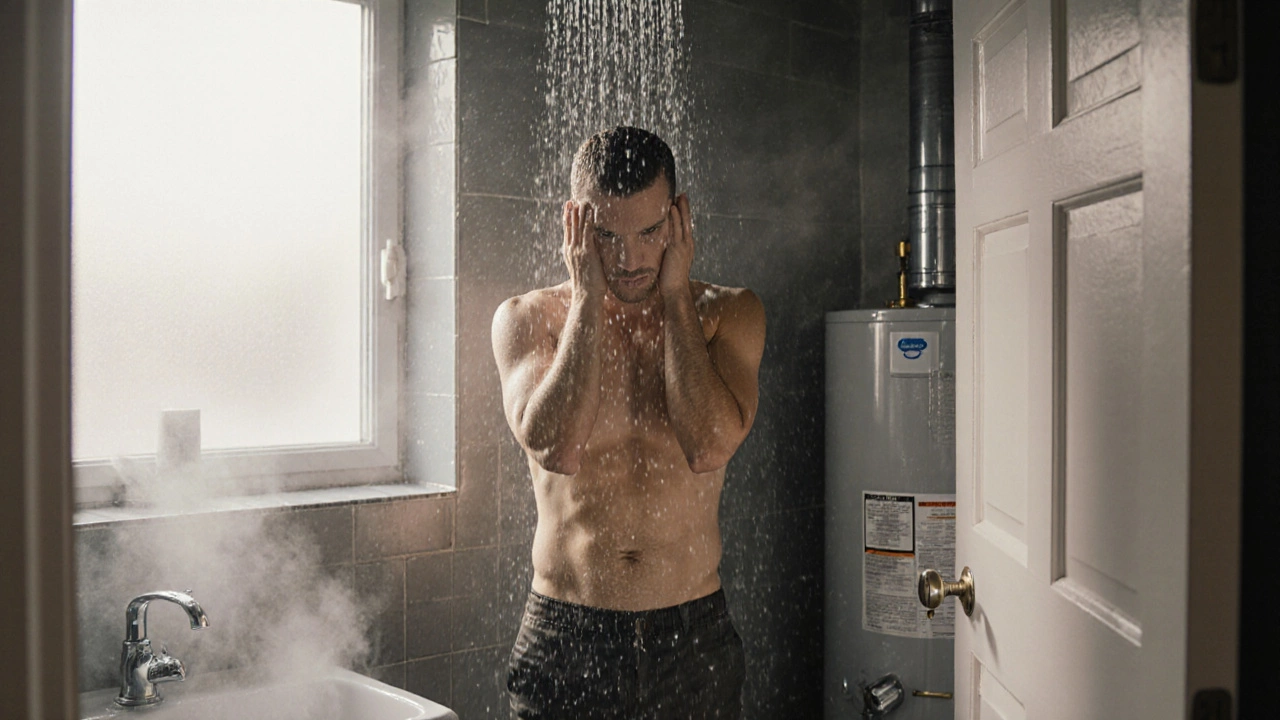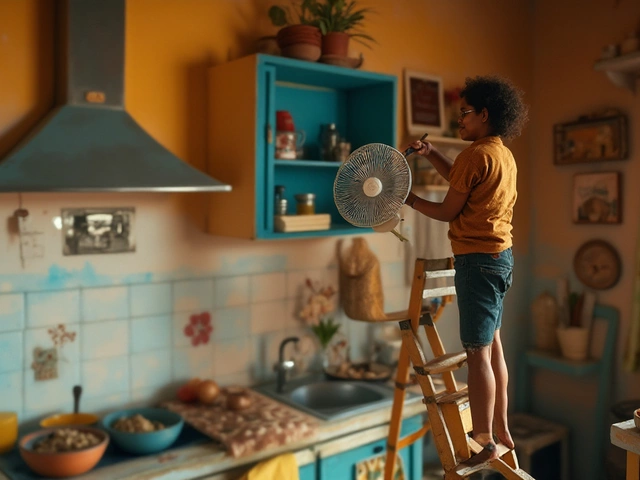If your hot water suddenly vanished-no warning, no notice-you’re not alone. Thousands of homeowners face this same panic every fall. One minute you’re enjoying a warm shower, the next you’re standing under icy spray wondering what went wrong. The good news? Most of the time, it’s not a full system failure. It’s something simple you can fix yourself, or know exactly when to call a pro.
Is it just your water heater?
Before you assume the worst, check if the problem is isolated. Turn on the hot water in another sink, shower, or bathtub. If none of them work, your water heater is likely the issue. But if only one fixture has no hot water, you’ve got a localized problem-a clogged aerator, a faulty mixing valve, or a broken pipe. Focus your troubleshooting on the heater only if all outlets are affected.Power issues (electric water heaters)
If you have an electric water heater, the most common cause of sudden hot water loss is a tripped breaker. Go to your electrical panel and look for the breaker labeled "Water Heater" or "Hot Water." It might be halfway between on and off. Flip it fully off, then back on. That’s it-sometimes, that’s all it takes. If the breaker trips again right away, something’s drawing too much current. That could mean a short in the heating element, a failing thermostat, or corroded wiring. Don’t keep resetting it. That’s a fire risk. Turn the breaker off and call a licensed electrician. Another common culprit: the high-limit switch. This safety feature shuts off power if the water gets too hot. It can trip due to a faulty thermostat or sediment buildup forcing the heater to overwork. Some models have a red reset button on the thermostat. Press it firmly. You’ll hear a click. If hot water returns, you fixed it. If not, the thermostat or element is likely bad.Gas water heater? Check the pilot light
Gas water heaters don’t need electricity to work, but they do need a pilot light. If that flame went out, you’ve got no hot water. Look at the bottom of the tank through the inspection window. Is there a small blue flame? If it’s gone, you’ve got a gas issue. First, turn the gas control knob to "Off" and wait five minutes. That lets any lingering gas clear. Then, follow the relighting instructions on the tank’s label. Usually, you turn the knob to "Pilot," press and hold the button, and light it with a long match or lighter. Keep holding the button for 30-60 seconds after the flame catches. Then turn the knob to "On." If the pilot won’t stay lit, the thermocouple is probably faulty. It’s a thin metal rod next to the pilot that senses heat. If it’s dirty, bent, or broken, it won’t signal the gas valve to stay open. Clean it gently with sandpaper, or replace it. They cost under $20 and are easy to swap.Sediment buildup is the silent killer
Over time, minerals in your water settle at the bottom of the tank. This isn’t just a myth-it’s science. Hard water areas like Phoenix, Austin, or Denver see this constantly. That sludge acts like insulation. The burner or element heats the sediment instead of the water. Result? Water takes forever to heat up, or doesn’t get hot at all. You might also hear popping or rumbling noises before the hot water stops. That’s the sediment boiling under the heat. It’s loud, annoying, and a sign you’re wasting energy. Flush your tank every year. Turn off the power or gas. Shut off the cold water inlet. Attach a garden hose to the drain valve at the bottom. Open the valve and let it run into a bucket or drain until the water runs clear. This takes 20-40 minutes. Do it once a year and you’ll extend your heater’s life by 5-10 years.
Thermostat settings got changed
It sounds silly, but people do this. Someone adjusts the thermostat to "Low" or "Vacation" mode, then forgets. Or a power surge resets it to factory defaults-often 120°F. That’s not hot enough for a full shower, especially if you have a large household or a long pipe run. Check your thermostat. Electric heaters usually have two: one for the top element, one for the bottom. Both should be set to 120-140°F. Gas heaters have one dial on the front. If it’s set below 120°F, turn it up. Wait an hour and test the water. If nothing changes, the thermostat is broken.Broken dip tube or heating element
The dip tube is the long plastic pipe that sends cold water to the bottom of the tank. If it cracks or breaks, cold water flows straight to the top. You get a few minutes of warm water, then it turns cold. This usually happens without warning. It’s more common in older heaters (10+ years). Heating elements can fail too. Electric heaters have two. If the top one dies, you get lukewarm water. If the bottom one dies, you get a few gallons of hot water before it runs out. You can test them with a multimeter. If you don’t have one, or don’t know how to use it, skip this step. Call a plumber.Age of your water heater
Most water heaters last 8-12 years. If yours is 10+ years old and suddenly stopped working, replacement is likely cheaper than repair. New models are 20-30% more efficient. You’ll save money on bills, and you won’t be stuck without hot water again next winter. Signs it’s time to replace:- Water is rusty or cloudy
- Leaking from the bottom or sides
- Constant repairs in the last year
- It takes over an hour to reheat

When to call a professional
You can fix most of these yourself. But call a pro if:- You smell gas (leave the house and call your utility company)
- The tank is leaking water from the bottom
- The breaker keeps tripping after resetting
- You’re not comfortable working with electricity or gas
Quick checklist: What to check first
If your hot water stopped suddenly, do this in order:- Check other faucets-does only one have no hot water?
- For electric: go to the breaker box and reset the water heater breaker
- For gas: look at the pilot light-is it lit?
- Check thermostat setting-is it turned down?
- Listen for noises-popping or rumbling means sediment
- Check the age of the heater-is it over 10 years old?
Prevent this from happening again
Install a water softener if you have hard water. It cuts mineral buildup by 70%. Flush your tank every 6-12 months. Set your thermostat to 120°F-it’s safe, efficient, and prevents scalding. And if your heater is older than 8 years, start budgeting for a replacement. Don’t wait until it fails in the middle of winter.Hot water isn’t a luxury. It’s basic comfort. Knowing what to check and when to call for help saves time, money, and stress. Most of the time, your water heater just needs a little attention-not a full replacement.
Why did my hot water suddenly stop working?
Hot water can stop suddenly due to a tripped breaker, a blown pilot light, sediment buildup, a broken thermostat, a failed heating element, or a damaged dip tube. The cause depends on whether your heater is electric or gas, how old it is, and your water quality. Most issues are fixable without replacing the whole unit.
Can a water heater fail without warning?
Yes, especially if it’s over 10 years old. Components like heating elements, thermostats, or dip tubes can fail suddenly. Sediment buildup can also cause gradual decline that feels sudden-like when you turn on the shower and get cold water after only a few seconds. Regular maintenance helps prevent this.
How long should hot water last in a tank?
A standard 40-gallon tank should provide 20-30 minutes of hot water for a single shower, assuming the heater is working properly and the thermostat is set to 120°F or higher. If you run out in under 10 minutes, the tank may be full of sediment, the heating element is failing, or the dip tube is broken.
Is it safe to reset a water heater breaker?
Yes, resetting a tripped breaker is safe and often fixes the issue. But if the breaker trips again immediately after resetting, do not keep trying. This signals a serious electrical fault-like a shorted heating element or wiring problem. Turn the power off and call an electrician.
Should I replace my water heater if it’s 12 years old?
If your water heater is 12 years old and just stopped working, replacement is usually the smarter choice. Repairs on aging units are temporary and costly. New models are more efficient, come with longer warranties, and reduce the risk of sudden leaks that can flood your home. Budgeting for replacement before it fails saves money and stress.



